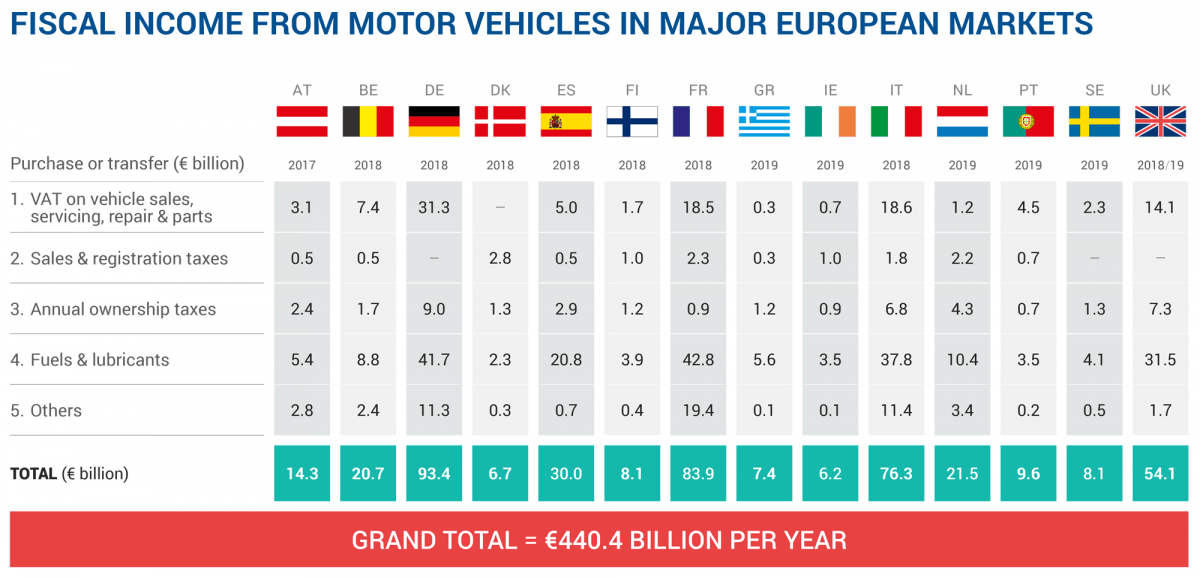The long-term tax savings of electric company cars and vans are under threat as governments start to assess the shortfall in revenue from lost fuel duty and road tax as motorists switch to battery power.
Motor vehicle taxation is worth €440.4 billion annually in 14 major European markets, of which more than half (€222bn) is duty and VAT on fuels and lubricants, according to the ACEA. The same governments raise a further €41.9bn in annual vehicle ownership taxes.
These revenue streams are set to decline sharply with the rapid transition to electric cars. Losing billions of euros in tax revenue would be a serious issue for healthy economies, but with governments facing a black hole in their finances due to coronavirus, treasury ministries are under particular pressure to find replacement revenue streams for diminishing motoring tax income.
Road pricing inquiry
In the UK, MPs on the Transport Select Committee have launched an inquiry into road pricing schemes, prompted by the government’s decision to bring forward a ban on the sale of petrol and diesel cars and vans to 2030.
Huw Merriman MP, Chair of the Transport Committee, said: “A consequence of the transition to electric vehicles is a potential £40 billion annual fiscal black hole, due to the reduction in Fuel Duty and Vehicle Excise Duty. Something will have to change.”
He explained that the inquiry will explore whether pay-as-you-driveschemes could offer a revenue-raising solution to the problem. MPs will also assess the level of public support for this type of system, what lessons can be learned from other countries that operate road pricing schemes, and whether the technology could be deployed to influence driver behaviour in an attempt to reduce congestion and increase walking and cycling.
‘Polluter pays’ becomes ‘user pays’
While most European fuel duty and vehicle ownership taxes are currently based on the principle of ‘polluter pays’, the new outlook envisages a ‘user pays’ approach – an electric car stuck in a traffic jam is just as much a cause of congestion as a diesel car.
Norway’s new EV ‘tax’
In Norway, Europe’s most advanced EV market, annual road tax has been replaced by a motor insurance tax, which electric cars will have to pay from March 1. The new daily charge of NOK5.85 (€0.56) for electric cars is in stark contrast to their former zero rating for road tax.
Singapore’s GPS charging scheme
Farther afield, Singapore is due to update its long-running Electronic Road Pricing scheme in the first half of this year, moving from a roadside system to satellite-based technology that will continue to charge drivers according to the road they are using, traffic speeds and levels of congestion.
Chew Men Leong, chief executive of Singapore’s Land Transport Agency, said: “Since [its] introduction, the road pricing system has been effective in managing traffic congestion. The next-generation road pricing system will allow us to improve on this, with greater flexibility.”
London to make EVs pay
Across Europe, a number of major cities, if not countries, have already introduced road pricing schemes in a bid to curb congestion. London was the first to introduce a congestion charge, back in 2003, and the daily toll has now risen to £15 (€16.50). Battery electric and hydrogen cars are currently exempt from the charge, but will have to start paying it from Christmas 2025.
Milan is another city that has transitioned a pollution charge to a congestion charge, although electric vehicles do not have to pay the €5 daily toll.
Stockholm’s flexible pay-as-you-drive congestion charging
But in Sweden, congestion charges in both Gothenburg and Stockholm apply to all cars and lorries (except emergency vehicles) with tolls varying throughout the day and rising from SEK15 (€1.5) at off-peak times to SEK45 (€45) in the morning and evening rush hour in the capital. Moreover, drivers pay each time they pass in or out of the city, up to a maximum of SEK135 (€13.40) per day.
In the short-term at least, electric cars look set to enjoy fiscal benefits over their equivalents with internal combustion engines, but as plug-in vehicles account for an ever greater share of new vehicle sales, fleet operators will need to anticipate new taxes or charges to replace fuel duties and annual road taxes.
Extracted from Fleet Europe
